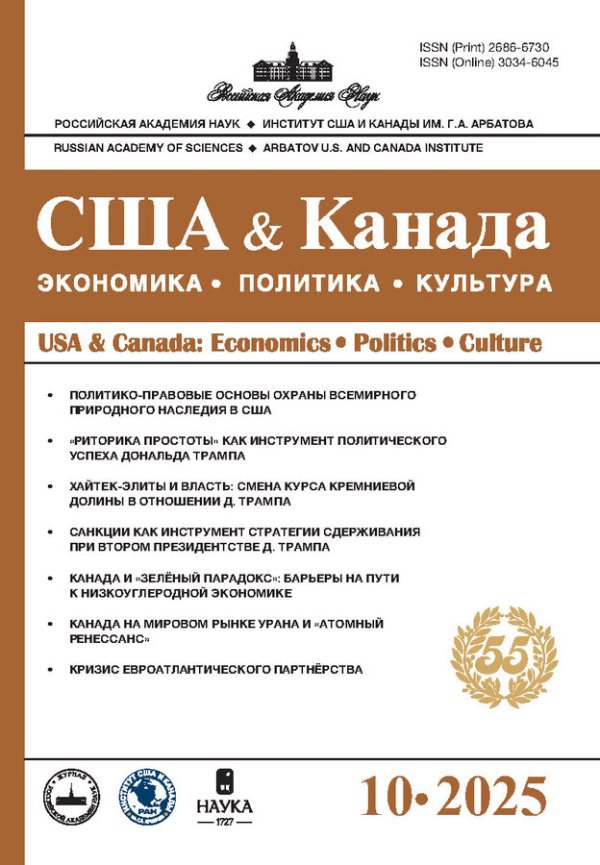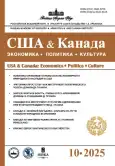USA & Canada: economics, politics, culture
The monthly publication “USA & Canada: Economics – Politics – Culture” (“USA & Canada” Journal) was founded in 1970 as “USA – Economics, Politics, Ideology” (since 1998 Canada was added). It's main purpose was and still is to inform readers about all aspects of domestic and foreign policies of the USA and Canada as well as current theoretical and practical issues of the international policy, world economic relations, development in different countries of the world. It publishes materials representing results of researches carried out by Russian specialists and foreign analysts on Russian – U.S. and Russian – Canada relations. Now it is the leading journal in Russia and CIS on all these matters. Also the journal publishes articles on such matters as security and defense policies, globalization and integration processes, innovation, scientific and technological progress, international terrorism and counter-terrorism, environmental challenges and cultural issues (literature, music, cinema, arts and architecture) etc.
Mission of the Journal is to provide a platform for authoritative researchers from Russia and the CIS countries to discuss processes and events taking place in the USA and Canada.
Among readers of “USA & Canada” journal are: international researchers and students of above mentioned issues, teachers, post-graduate students and students of higher education institutions, executives and staff of federal and regional state authorities, managers and analysts of banks, corporations, large enterprises.
Among the authors of the journal are: the leading analysts of the Institute of USA & Canada Studies, Russian Academy of Sciences, researchers from other Russian academic and non-academic think-tanks of international profile, foreign researchers, industry analysts and banking experts, professors of the universities and higher education institutions, post-graduate students, representatives of the legislative and executive bodies of the Russian Federation and the CIS countries.
The journal is included in the Russian Higher Attestation Commission List of peer-reviewed scientific publications.
The “USA & Canada: Economics – Politics – Culture” journal is distributed by advance subscription only, and is not offered for sale. The subscription may be accomplished in every post-office in Russia using the Federal Postal Service union catalogue, section “ARSMI», the journal index 70925. The subscription may start from every month, for any number of issues.
Since 2009 it has been possible to receive the full-text online version. The subscription for it is done centrally through the Russian Electronic Library system https://elibrary.ru/title_about.asp?id=8241
Editor-in-Chief of the journal - A. Panov.
Media registration certificate: ПИ № ФС 77 - 71487 от 13.11.2017
Edição corrente
Nº 10 (670) (2025)
- Ano: 2025
- Artigos: 11
- URL: https://rjsvd.com/2686-6730/issue/view/14367
Edição completa
Economics
US Sanctions Policy towards Russia's Oil Complex
Resumo
 5-16
5-16


Canada's Role in Global Uranium Market
Resumo
 17-31
17-31


Domestic Politics
Donald Trump's Presidential Discourse: From Loser to Winner
Resumo
 32-44
32-44


What is Behind the Silicon Valley Leaders' Transition to the President Donald Trump's Team?
Resumo
 45-56
45-56


Foreign Policy
Conflict Potential of Transatlantic Relations During Donald Trump's Second Term
Resumo
 57-69
57-69


The Ukraine Conflict and U.S. Sanctions Policy Against Russia
Resumo
 70-82
70-82


Ecology
Canada's «Green Paradox»: Between Ambition and Reality
Resumo
 83-95
83-95


Solar Generation in the US Power Grid: Issues and Opportunities
Resumo
 96-110
96-110


State and law
Legal Protection of Natural World Heritage in the United States
Resumo
 111-122
111-122


Reader’s Deliberations
American Intelligence on Russia's Role in the Modern System of International Relations
Resumo
 123-127
123-127


Articles
Informatsiya dlya avtorov
 128-128
128-128













